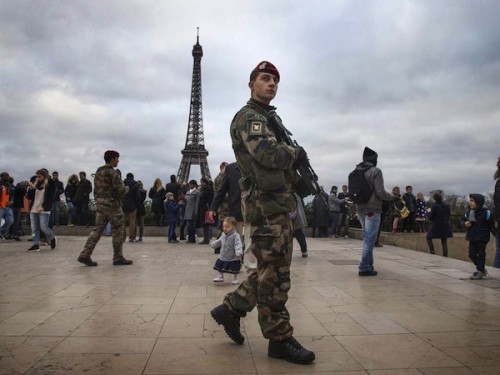Co-ordinated attacks throughout Paris last November killed over 100 for Allah, including the people enjoying outdoor cafes like the one below.

Soldiers now guard iconic landmarks like the Eiffel tower.

Sensible travelers are responding rationally by going elsewhere. Paris businesses are suffering as a result, although no reporters have asked owners whether they think diversity is strength.
In addition, France has cancelled numerous public events because of the jihad threat to public safety.
Paris tourism chiefs demand rescue plan as attacks scare off visitors, Reuters, August 23, 2016Islamist attacks have scared off thousands of tourists from Paris and its top attractions, helping rob the French capital of about 750 million euros ($850 million) in revenues, officials said on Tuesday.
Strikes and floods have also taken their toll, overshadowing a boost from the Euro 2016 soccer championships and leaving the tourism industry in need of massive new investment and a rescue package, representatives of the sector said.
“It’s time to realize that the tourism sector is going through an industrial disaster,” the head of the Paris region tourist board, Frederic Valletoux, said in a statement.
Visitors to the Arc de Triomphe fell more than a third in the first half of 2016 from the same period a year earlier, the tourist board said.
The Grand Palais museum reported a 43.9 percent slump and the Palace of Versailles just short of 20 percent.
“Hotels are already laying off staff though they’re not saying it. This industry is on its knees and it needs relief measures now. Hoteliers need the weapons to fight back,” Georges Panayotis, head of hotel research firm MKG group, told Reuters.
HOPES DERAILED Hotel revenues were down 15 percent this summer in the Paris region, he said. Wealthier tourists in particular were staying away, with high-end hotels reporting declines of between 30 and 40 percent.
Targeted VAT cuts and other tax breaks could help, Panayotis said.
Tourism typically provides more than 7 percent of France’s gross domestic product.
But it has had to contend with a series of disasters, from Islamic State attacks that killed 130 people in Paris last year to the carnage when a gunman drove a truck into crowds celebrating Bastille Day in the Riviera city of Nice this July.
“The Nice attack derailed our hopes of a recovery. It’s a dramatic situation and there will be job cuts in the sector if things do not get better by the end of the year,” Christian Navet, head of the UMIH-Paris-Ile-de-France hotel federation, said.
The number of Japanese visitors almost halved in the first half of the year from last, according to tourist board figures. Russian numbers were down by more than a third and Chinese by almost a fifth.
Weak activity in France contributed to a fall in first-half operating profit for French group AccorHotels. Air France-KLM expects its unit revenues to decline in July and August, partly due to the situation at home.
Only massive new investments can help protect jobs, said the tourist board’s Valletoux, urging Foreign Minister Jean-Marc Ayrault to meet officials from the sector.
“This is no longer the time for communication campaigns but to set up a relief plan,” he said.
In a message on Twitter, Ayrault said he was adding 500,000 euros to the 1 million-euro budget the state was contributing under a global 2.5 million-euro plan unveiled in March to promote France as a tourist destination.
($1 = 0.8830 euros)